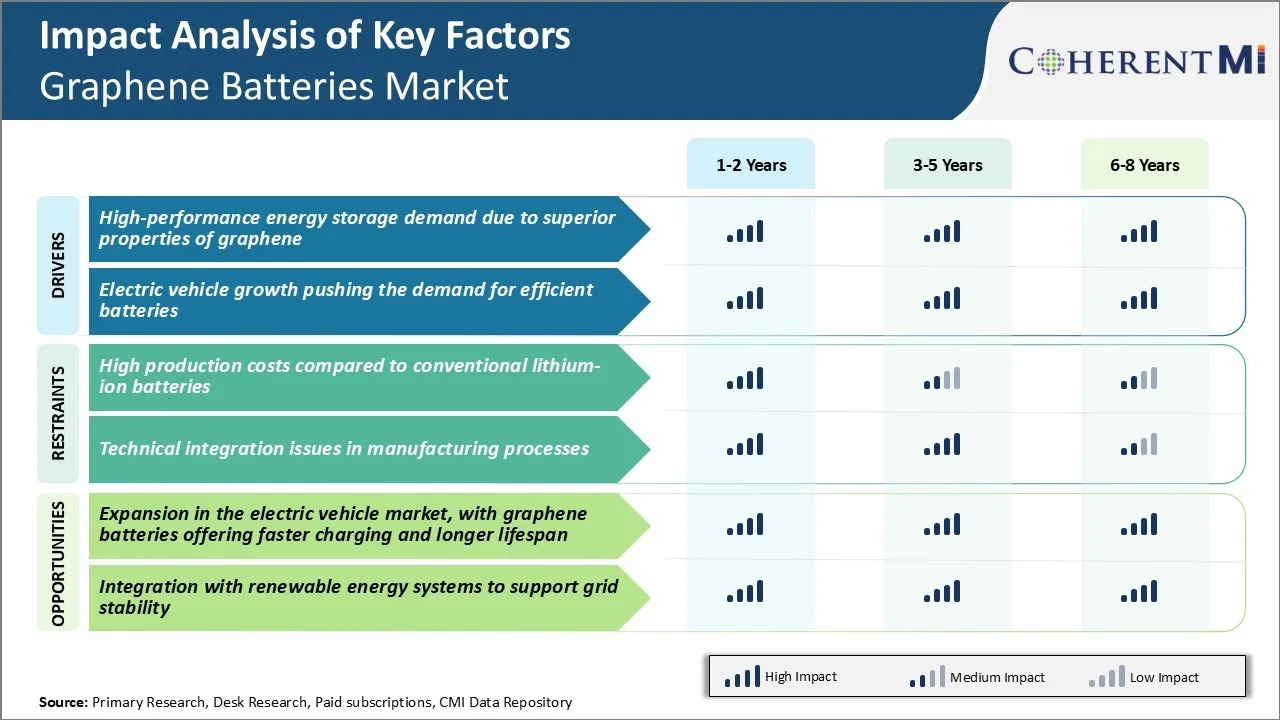Graphene Batteries Market Trends
Market Driver - Superior Properties of Graphene Creating Demand for High-performance Energy Storage
The outstanding properties of graphene make it an ideal material for developing next-generation batteries with high storage capacity and rapid charging and discharging capabilities. Graphene has incredibly high electrical and thermal conductivity combined with exceptional mechanical strength and flexibility. It also finds applications in electric vehicles where extended range is crucial and fast charging solutions are paramount.
Robotics, automation, 3D printing, and other advanced manufacturing rely on compact yet powerful battery backups. Graphene with its outstanding power attributes fulfills this need. Similarly, portable medical equipment and devices require reliable long-life batteries that graphene is perfectly positioned to deliver. Wearable tech is another frontier market where lightweight energy sources like graphene batteries could propel future innovations.
This will push graphene batteries market players to support development of revolutionary devices empowered by next-gen power sources. The widespread demand for high performance energy storage spurred by the superior attributes of graphene thus, will drive growth of the graphene batteries market.
Market Driver - Electric Vehicles Driving the Need for Efficient Battery Solutions
The automotive industry is amidst a paradigm shift towards electrification with major carmakers globally launching electric vehicles at an unprecedented rate. Both battery-powered and plug-in hybrid electric vehicles are gaining widespread acceptance. A critical success factor for the mass adoption of EVs, however, remains the development of higher capacity and faster charging batteries.
For electric cars to truly replace gasoline models, batteries need to empower longer driving distance between charges and re-fuel way more rapidly. This is where the potential of graphene comes into play; its extraordinary properties allow for batteries with higher energy and power density compared to graphite batteries.
Automakers are increasingly collaborating with graphene battery developers to engineer cutting-edge solutions. These advanced batteries will allay consumer anxiety over range and usability. The proliferation of high-performing graphene batteries is undeniably critical to achieving the sector's ambitious electrification goals.

Market Challenge - High Production Costs Compared to Conventional Lithium-ion Batteries
One of the key challenges currently faced by the graphene batteries market is its significantly higher production costs compared to conventional lithium-ion batteries. Producing graphene in large volumes and incorporating it into battery materials and cells is a highly complex process that requires specialized equipment and facilities.
Furthermore, the process of assembling graphene components into battery anodes and cathodes with the required nano-scale structures and dispersions also adds to expenses.
All these factors make graphene batteries much more expensive to manufacture on a commercial scale at present. For widespread adoption, especially in mass consumer markets like smartphones and electric vehicles, the costs need to come down significantly. This can be done through manufacturing optimizations, economies of scale, and technological advancements that enable simpler, lower-cost production processes.
Until costs approach parity with lithium-ion, graphene batteries market growth may remain constrained to niche high-performance applications.
Market Opportunity - Expansion in the Electric Vehicle Market
One major opportunity for the graphene batteries market lies in the rapidly expanding electric vehicle industry. As more automakers invest heavily in electric vehicle production to transition to greener mobility solutions, the need for higher performing battery technologies is growing. Graphene batteries offer compelling advantages for electric vehicles by enabling much faster charging times as well as a longer driving range per charge compared to lithium-ion. This is because graphene's properties allow for faster ion conduction and higher energy density.
As a result, graphene batteries could power the next generation of long-range electric vehicles and accelerate the mass adoption of EVs. With many governments also announcing plans to phase out combustion engine vehicles in the coming years, the electric vehicle market is projected to experience exponential worldwide growth.
Thereby, growing EV market demand presents a massive opportunity for graphene batteries to play a pivotal role if costs can be reduced.